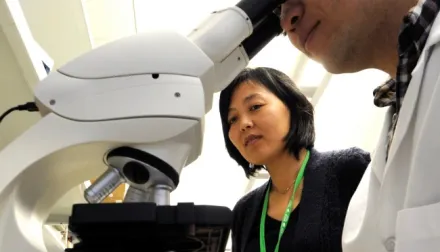
Digestive Diseases and Nutrition Research
The College of Medicine Division of Digestive Diseases and Nutrition has an array of faculty members and fellows who are involved in a wide variety of investigations to improve clinical health care. The division consists of numerous industry-sponsored multi-center and single investigator-initiated trials. Our current trials are focused on the areas of celiac disease, Crohn’s disease, nonalcoholic steatohepatitis, and ulcerative colitis.
The UK Endoscopy Center is focusing on projects in which endoscopy is the subject under investigation. These include new endoscopic techniques, assessment of endoscopic technologies, and evaluation of endoscopy outcomes. A variety of active research protocols in endoscopy are currently underway.
Our research coordinators have over 22 years combined research experience. For more information please call 859-323-6423.

Terrence Barrett, MD, Lab
A major goal in the treatment of patients with inflammatory bowel disease (IBD) is the completion of mucosal repair. The failure to heal ulcers is a characteristic finding in IBD and typifies why patients experience weight loss with chronic diarrhea, intestinal bleeding, intestinal obstruction, and severe abdominal pain. Unfortunately, many attempts to treat IBD fail to achieve this goal resulting in surgical interventions.
The goal of the Barrett Lab is to investigate the cause of non-healing ulceration in IBD. Studies in our lab utilize murine and in vitro models of IBD as well as tissue collected from patients during endoscopic procedures. Our goal is to identify therapeutic targets to allow for enhanced mucosal repair in IBD.
SPORE Alliance Internal Medicine Team Members
- Lowell Anthony, MD, Division Chief
- Terrence A. Barrett, MD, Professor
- Aman Chauhan, MD, Assistant Professor
- Mark Dignan, PhD, MPH, Professor
